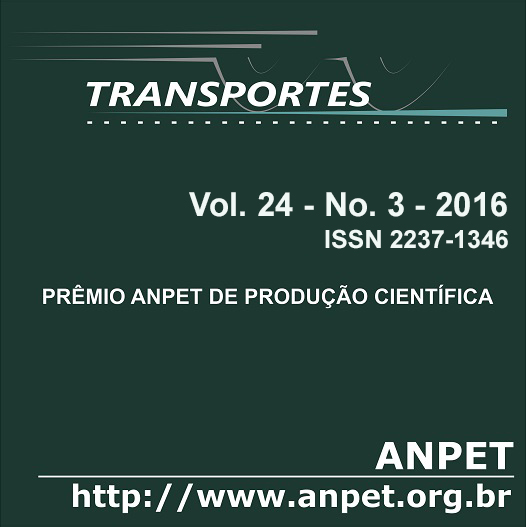Modelos matemáticos baseados no Time Dependent Vehicle Routing Problem para planejamento da logística urbana sob a ótica ambiental
DOI:
https://doi.org/10.14295/transportes.v24i3.1101Keywords:
Urban Logistics, Time Dependent Vehicle Routing Problem (TDVRP), Sustainable Logistics.Abstract
Urban logistics companies are seeking solutions to reduce their cost, but must of them are not paying attention to environmental issues. This is due to the belief that environmentally friendly solutions are more expensive. However, with the growing of environmental concerns, companies have been taking into account the environmental factors, seeking for their social responsibility. Thus, this paper presents two mathematical models, both based on the Time Dependent Vehicle Routing Problem (TDVRP), one to evaluate the reduction in the time of the routes and the other to evaluate the reduction of greenhouse gas emissions. In order to evaluate the model, a real case of a food distribution company in the metropolitan area of Vitória, ES was done. CPLEX 12.6 was used to run both models considering scenarios based on data from a real company. The results showed that environmentally friendly solution may be also financially advantageous for the company.Downloads
References
BEKTAŞ, Tolga; LAPORTE, Gilbert. The pollution-routing problem. Transportation Research Part B: Methodological, v. 45, n. 8, p. 1232-1250, 2011. DOI: 10.1016/j.trb.2011.02.004
DONATI, Alberto V. et al. Time dependent vehicle routing problem with a multi ant colony system. European journal of operational research, v. 185, n. 3, p. 1174-1191, 2008. DOI: 10.1016/j.ejor.2006.06.047
ERDOĞAN, Sevgi; MILLER-HOOKS, Elise. A green vehicle routing problem. Transportation Research Part E: Logistics and Transportation Review, v. 48, n. 1, p. 100-114, 2012. DOI: 10.1016/j.tre.2011.08.001
EEA, EMEP. EEA air pollutant emission inventory guidebook, Technical guidance to prepare national emission inventories, Part B — 2013. European Environment Agency (EEA), Copenhagen, 2013.
ERICSSON, Eva; LARSSON, Hanna; BRUNDELL-FREIJ, Karin. Optimizing route choice for lowest fuel consumption–potential effects of a new driver support tool. Transportation Research Part C: Emerging Technologies, v. 14, n. 6, p. 369-383, 2006. DOI: 10.1016/j.trc.2006.10.001
FLEISCHMANN, Bernhard; GIETZ, Martin; GNUTZMANN, Stefan. Time-varying travel times in vehicle routing. Transportation science, v. 38, n. 2, p. 160-173, 2004. DOI: 10.1287/trsc.1030.0062
HILL, Arthur V.; BENTON, W. C. Modelling intra-city time-dependent travel speeds for vehicle scheduling problems. Journal of the Operational Research Society, v. 43, n. 4, p. 343-351, 1992. DOI: 10.1057/jors.1992.49
IBM. (2016) IBM ILOG CPLEX Optimization Studio. Disponível em: http://www-03.ibm.com/software/products/en/ibmilogcpleoptistud. Acesso em: 10 de Março de 2016.
ICHOUA, Soumia; GENDREAU, Michel; POTVIN, Jean-Yves. Vehicle dispatching with time-dependent travel times. European journal of operational research, v. 144, n. 2, p. 379-396, 2003. DOI: 10.1016/S0377-2217(02)00147-9
JABALI, O.; WOENSEL, T.; DE KOK, A. G. Analysis of travel times and CO2 emissions in time‐dependent vehicle routing. Production and Operations Management, v. 21, n. 6, p. 1060-1074, 2012. DOI: 10.1111/j.1937-5956.2012.01338.x
KIRBY, Howard R. et al. Modelling the effects of transport policy levers on fuel efficiency and national fuel consumption. Transportation Research Part D: Transport and Environment, v. 5, n. 4, p. 265-282, 2000. DOI:10.1016/S1361-9209(99)00037-1
KUCUKOGLU, I. et al. Green capacitated vehicle routing problem fuel consumption optimization model. Computational Engineering Research, v. 3, p. 16-23, 2013.
LAPORTE, Gilbert. What you should know about the vehicle routing problem. Naval Research Logistics (NRL), v. 54, n. 8, p. 811-819, 2007. DOI: 10.1002/nav.20261
LIN, Canhong et al. Survey of green vehicle routing problem: past and future trends. Expert Systems with Applications, v. 41, n. 4, p. 1118-1138, 2014. DOI: 10.1016/j.eswa.2013.07.107
MALANDRAKI, Chryssi; DASKIN, Mark S. Time dependent vehicle routing problems: Formulations, properties and heuristic algorithms. Transportation science, v. 26, n. 3, p. 185-200, 1992. DOI: 10.1287/trsc.26.3.185
MALANDRAKI, Chryssi; DIAL, Robert B. A restricted dynamic programming heuristic algorithm for the time dependent traveling salesman problem. European Journal of Operational Research, v. 90, n. 1, p. 45-55, 1996. DOI: 10.1016/0377-2217(94)00299-1
NANNICINI, Giacomo et al. Fast paths in large-scale dynamic road networks. Computational Optimization and Applications, v. 45, n. 1, p. 143-158, 2010. DOI:10.1007/s10589-008-9172-y
PALMER, Andrew. The development of an integrated routing and carbon dioxide emissions model for goods vehicles. PhD thesis, Cranfield University, School of Management, 2007.
SCOTT, Cathy; URQUHART, Neil; HART, Emma. Influence of topology and payload on CO2 optimised vehicle routing. In: European Conference on the Applications of Evolutionary Computation. Springer Berlin Heidelberg, 2010. p. 141-150. DOI: 10.1007/978-3-642-12242-2_15
TANIGUCHI, Eiichi; THOMPSON, Russell G. City Logistics Network Modelling and Intelligent Transport Systems. 2001.
VAN WOENSEL, Tom; VANDAELE, Nico. Empirical validation of a queueing approach to uninterrupted traffic flows. 4OR, v. 4, n. 1, p. 59-72, 2006.
VAN WOENSEL, Tom.; CRETEN, Ruth; VANDAELE, Nico. Managing the environmental externalities of traffic logistics: The issue of emissions. Production and Operations Management, v. 10, n. 2, p. 207-223, 2001. DOI: 10.1111/j.1937-5956.2001.tb00079.x
VAN WOENSEL, Tom et al. Vehicle routing with dynamic travel times: A queueing approach. European journal of operational research, v. 186, n. 3, p. 990-1007, 2008. DOI: 10.1016/j.ejor.2007.03.012
Downloads
Published
How to Cite
Issue
Section
License
Authors who submit papers for publication by TRANSPORTES agree to the following terms:
- Authors retain copyright and grant TRANSPORTES the right of first publication with the work simultaneously licensed under a Creative Commons Attribution License that allows others to share the work with an acknowledgement of the work's authorship and initial publication in this journal.
- Authors may enter into separate, additional contractual arrangements for the non-exclusive distribution of this journal's published version of the work (e.g., post it to an institutional repository or publish it in a book), with an acknowledgement of its initial publication in TRANSPORTES.
- Authors are allowed and encouraged to post their work online (e.g., in institutional repositories or on their website) after publication of the article. Authors are encouraged to use links to TRANSPORTES (e.g., DOIs or direct links) when posting the article online, as TRANSPORTES is freely available to all readers.
- Authors have secured all necessary clearances and written permissions to published the work and grant copyright under the terms of this agreement. Furthermore, the authors assume full responsibility for any copyright infringements related to the article, exonerating ANPET and TRANSPORTES of any responsibility regarding copyright infringement.
- Authors assume full responsibility for the contents of the article submitted for review, including all necessary clearances for divulgation of data and results, exonerating ANPET and TRANSPORTES of any responsibility regarding to this aspect.









